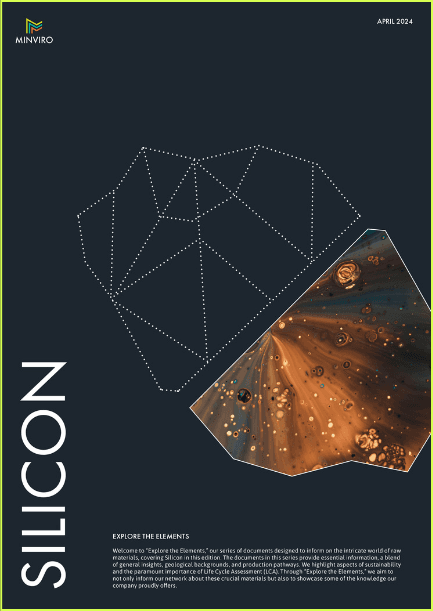- solutions
- industries
- about us
- resources
Client Resources
Explore the Elements: Silicon
By Keno Ignace
Explore the crucial role of Silicon, an abundant element in Earth's crust and an important element of modern technology. This blog post delves into the various states and applications of Silicon, from its natural form to its critical use in electronics, photovoltaics, and advanced battery technologies. Discover how Silicon, a key semiconductor during the "Silicon Age," drives digital development and supports clean energy transitions.
Download
The outline
What is Silicon?
Silicon (Si) is a metalloid, abundant in Earth's crust, and is key in various industries due to its semi-conductive properties. It's used widely in electronics, photovoltaics, and more, but its production is energy-intensive and has significant environmental impacts.
This specific white paper is focused on Silicon.
Understanding Silicon: Properties, Occurrence, and Forms
Silicon, symbol Si and atomic number 14, is a hard, brittle crystalline solid with a metallic lustre. Found primarily in forms like sand, quartz, and silicates, it is rarely pure in nature due to its affinity for oxygen.
Silicon Applications: Essential Uses in Electronics, Construction, and Energy
Silicon is instrumental in the construction, electronics, and energy sectors. It's pivotal in the digital era, commonly used in chips and circuits, and critical for photovoltaic cells in solar panels.
Silicon in Clean Energy: Transforming Photovoltaics and Battery Technology
Silicon's role in photovoltaics is substantial, comprising 90-95% of materials in solar modules. It’s also emerging as a potential game-changer in battery technology.
Silicon Production Methods: From High-Temperature Processes to Advanced Purification
Silicon metal is produced through high-temperature processes involving sand and carbon. For higher purity, required in electronics and solar cells, further chemical processing is used.
Global Silicon Market Trends: Dominance and Growth in Electronics, Photovoltaics, and Battery Sectors
China dominates the global silicon metal production. The market is expected to grow, driven by demand in electronics, photovoltaics, and battery technology.
Evaluating Silicon's Environmental Impact: The Crucial Role of Life Cycle Assessments (LCAs)
Life cycle assessments (LCAs) are essential for understanding the environmental impacts of silicon production. They help identify and mitigate high-impact areas across its supply chain.
Advancing Sustainability in Silicon Supply Chains: Energy, Emissions, and Recycling Solutions
Sustainability challenges include high energy consumption and CO2 emissions during production. Solutions include using bio-based reducing agents and recycling silicon despite the purity challenges.
download
Get access today
Fill in the form below
Download
